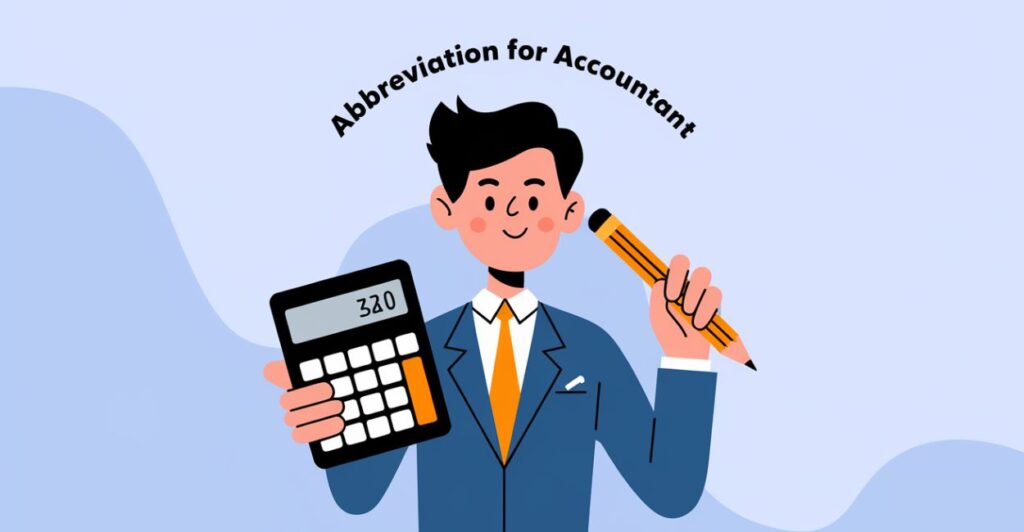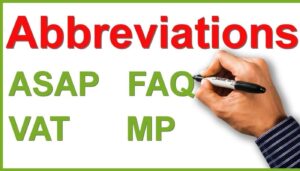Whether you’re embarking on a career in finance, or simply curious about the lingo in the world of business, understanding common abbreviations is crucial. One term you’ll likely encounter often is “accountant.”
But did you know that accountants also have abbreviations that simplify their titles and roles? In this article, we will explore the various abbreviations used for accountants, provide clear definitions, and offer insights into the nuances of these terms.
By the end of this guide, you’ll not only be well-versed in the abbreviations for accountants but also understand their significance in the business and finance world. Let’s dive in!
1. What Does an Accountant Do?
Before we explore the abbreviations, it’s important to understand the role of an accountant. Accountants are professionals who manage financial records for individuals or businesses.
Their responsibilities typically include analyzing financial data, ensuring compliance with tax laws, preparing tax returns, and offering financial advice.
Accountants can work in various industries, from public accounting firms to private companies, and even within government organizations.
There are different types of accountants, such as Certified Public Accountants (CPAs), management accountants, forensic accountants, and others, each specializing in different areas of finance.
2. The Most Common Abbreviations for Accountant
Now, let’s take a closer look at the most common abbreviations for accountants and what they mean. These terms are widely used in the accounting field to refer to specific certifications, qualifications, or job titles.
2.1. CPA – Certified Public Accountant
Definition: One of the most well-known abbreviations in the accounting world is CPA, which stands for Certified Public Accountant. To become a CPA, an individual must pass a rigorous exam, meet educational requirements, and gain relevant work experience.

What It Means: The CPA credential is a prestigious designation in accounting, and it signifies that the individual has a high level of expertise and knowledge in the field. CPAs are authorized to perform a wide range of duties, including auditing, tax preparation, and providing financial consulting services.
Key Points:
- CPAs must pass the Uniform CPA Exam.
- They are licensed by individual state boards of accountancy.
- CPAs can work in public accounting firms or be employed in private companies.
Example: “I hired a CPA to help me with my taxes this year since I have a few complex deductions.”
2.2. CA – Chartered Accountant
Definition: Chartered Accountant (CA) is a designation used primarily in countries outside of the United States, such as the UK, Canada, India, and Australia. CAs are also highly qualified professionals who manage financial records, provide audit services, and offer financial advice.
What It Means: The CA designation is often compared to the CPA but typically requires different qualifications depending on the country. For example, in the UK, a CA is a member of the Institute of Chartered Accountants in England and Wales (ICAEW).
Key Points:
- CAs are members of specific professional organizations.
- They undergo comprehensive exams and practical training.
- In some countries, the CA designation is considered equivalent to a CPA.
Example: “I’m considering working with a CA from Canada to help my business expand internationally.”
2.3. CMA – Certified Management Accountant
Definition: CMA stands for Certified Management Accountant. This designation focuses on the financial management and strategy side of business, particularly in management accounting. CMAs are experts in cost management, financial analysis, and budgeting.
What It Means: CMAs are typically employed by large corporations or in management roles where financial decision-making is critical. The CMA certification helps professionals advance in leadership positions by demonstrating expertise in management accounting and financial planning.
Key Points:
- CMAs have expertise in internal business management.
- They are often involved in cost analysis and decision-making.
- The certification process includes exams and practical experience.
Example: “The company’s CFO is a CMA, and they’ve helped streamline our budgeting process.”
2.4. EA – Enrolled Agent
Definition: An Enrolled Agent (EA) is a tax professional who is licensed by the IRS to represent taxpayers in all matters related to the Internal Revenue Service. Unlike CPAs, who can handle a variety of accounting duties, EAs specialize in taxation.
What It Means: EAs are tax experts who can provide tax preparation services, advise on tax-related issues, and represent clients during IRS audits. To become an EA, individuals must pass a comprehensive IRS exam or have previous experience working with the IRS.
Key Points:
- EAs specialize in tax issues and tax law.
- They are licensed by the IRS.
- They can represent taxpayers before the IRS, which CPAs and attorneys can also do.
Example: “We hired an EA to represent us during our IRS audit last year.”
2.5. FA – Forensic Accountant
Definition: A forensic accountant is a specialized accountant who investigates financial discrepancies and fraud. Forensic accountants are often involved in legal matters, providing their expertise in detecting financial crimes or uncovering evidence of fraud.
What It Means: Forensic accountants use their accounting skills to trace financial transactions, uncover irregularities, and even assist in legal proceedings. They often work with law enforcement, lawyers, and corporations to investigate financial crimes like embezzlement or money laundering.
Key Points:
- Forensic accountants specialize in fraud detection and financial investigations.
- They often work in legal settings, providing evidence in court cases.
- Their role requires deep knowledge of accounting and law enforcement procedures.
Example: “A forensic accountant was brought in to investigate the company’s missing funds.”
2.6. CIA – Certified Internal Auditor
Definition: The CIA (Certified Internal Auditor) designation is given to individuals who specialize in internal auditing. Internal auditors are responsible for reviewing and evaluating an organization’s internal controls, risk management processes, and compliance with regulations.
What It Means: CIAs help organizations improve their internal processes by identifying weaknesses or inefficiencies. They are often employed by large companies or government agencies to assess financial practices and ensure compliance with internal policies and external regulations.
Key Points:
- CIAs focus on internal controls, risk management, and compliance.
- They help identify inefficiencies and recommend improvements.
- The certification process includes an exam and work experience.
Example: “The company hired a CIA to assess the integrity of its internal controls.”
3. Why Are These Abbreviations Important?

Knowing the abbreviations for accountants is more than just about understanding titles. These certifications and designations signify expertise, specialization, and levels of authority within the accounting profession. When you come across one of these abbreviations, it gives you insight into what the person does, how they can help, and what kind of qualifications they hold.
Additionally, understanding these terms can help you make informed decisions when you need professional accounting services. Whether you’re hiring someone for personal taxes, business accounting, or fraud investigation, knowing the right credentials to look for ensures you choose a qualified professional for the job.
4. How to Choose the Right Accountant for Your Needs
Understanding these abbreviations can guide you in selecting the best accountant for your specific situation. Here are a few tips to help you choose:
- Identify Your Needs: Are you looking for tax help, fraud investigation, or general financial management advice? Knowing the type of services you require will help you determine which type of accountant (e.g., CPA, EA, FA) is best suited for your needs.
- Check Their Credentials: Look for certifications such as CPA, CA, or CMA, depending on what you need. You can usually verify credentials through professional organizations or licensing boards.
- Consider Experience: Beyond certifications, experience is important. For example, if you need help with a complex business audit, a CPA with years of experience in auditing might be the best fit. If you’re dealing with a personal tax issue, an EA might be more appropriate.
- Review Reviews and References: Before making a decision, check reviews or ask for references from other clients. Word of mouth and personal referrals can provide valuable insights into an accountant’s skills and professionalism.
5. Final Words
Abbreviations like CPA, CA, CMA, and EA are more than just letters—they represent specialized knowledge and qualifications in the field of accounting. Understanding these terms gives you the tools to navigate the world of accounting more effectively, whether you’re hiring a professional or simply broadening your understanding of the industry.
The right accountant can make a significant difference in your financial success, so take the time to understand the certifications and expertise they offer. Armed with this knowledge, you’ll be able to make informed decisions that align with your specific financial needs.
Remember, accounting doesn’t have to be a mystery. With the right professional on your side, you can confidently manage your finances and focus on what matters most to you.









